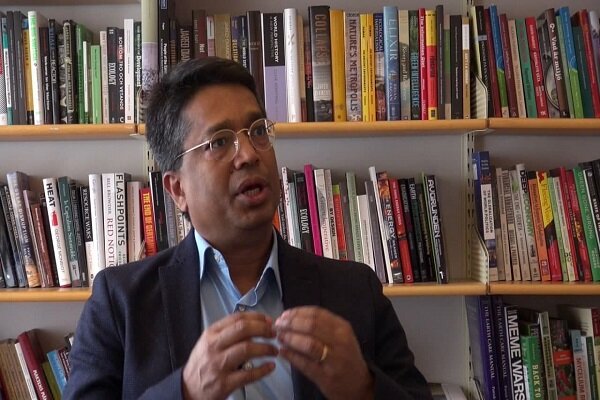It’s easier for U.S. to work with monarchies than democracies: professor

TEHRAN - It is easier for the U.S. to work with monarchies than democratic countries because in a monarchical system there is no dramatic change or shift of power, a leading Indian academic says.
“If you wish to keep client states for your own development and security, it is easy and reliable to support monarchies than democracies,” Ashok Swain tells the Tehran Times.
“You only need to deal with one person and his coterie in a monarchy and that leadership set continues almost forever,” says Swain, professor of peace and conflict research at the Department of Peace and Conflict Research at Uppsala University.
U.S. strategic ties with Arab monarchies and tyrannical regimes have cast questions about American commitment to democratic values all around the world.
Supporting West Asian monarchies, successive American administrations have taken destructive measures against democratic countries and movements.
That is a contradiction that how a country that proclaims itself a stronghold of democracy is pushing to undermine democratic values around the globe.
Apparently, that is a matter of long-term interests where the U.S. cannot count on democratic countries to meet its demands.
“But, in a democracy, you are forced to deal with a number of political actors, institutions, and pressure groups in the country. You have to be prepared to adjust to a change of regime in every election cycle,” Swain underlines.
“So, it is natural that the U.S. prefers Arab monarchies to continue backing instead of supporting democratization in the region,” he notes.
Following is the text of the interview:
Q: Is there any correlation between democracy and wars? The U.S. claims democracy while it has waged wars in West Asia.
A: The democratic peace theory argues that democratic countries have seldom fought against each other. Though there is a near-unanimous agreement that democracies do not fight each other, why they don’t do it and why that so-called democratic peace exists has no easy explanation. Moreover, at the same time, it should not be confused those democracies are, in general, more peaceful than nondemocratic countries. In the last two centuries, no other country in the world has fought more wars than the ‘democratic’ U.S. At present, only in the Middle East (West Asia) region, the U.S. engaged in wars in Afghanistan, Iraq, Syria, and Yemen. If we expand the definition of war, then the U.S. is involved in covert military operations in probably all the countries in the region.
Q: What are the main factors of destabilization in West Asia, external meddling, or domestic problems in countries in West Asia and North Africa?
A: The domestic deficit of regime legitimacy and external meddling complement each other well in the Middle East (West Asia). Most of the regimes in the region need external support to continue to be in power. The vast natural resources and strategic importance make the region an attractive place for the foreign powers to exploit the regimes' weakness and create instability to maintain their supremacy.
Q: Why does America support Arab monarchies in West Asia? Can American democracy be exported to these countries?
A: If you wish to keep client states for your own development and security, it is easy and reliable to support monarchies than democracies. You only need to deal with one person and his coterie in a monarchy and that leadership set continues almost forever. But, in a democracy, you are forced to deal with a number of political actors, institutions, and pressure groups in the country. You have to be prepared to adjust to a change of regime in every election cycle. So, it is natural that the U.S. prefers Arab monarchies to continue backing instead of supporting democratization in the region. Democracies can't be exported, nor they consolidate overnight. The whole democratization process has to be homegrown, and considerable time is needed for the democracy to establish itself.
Q: America accuses its rivals including Russia and China of suppressing people. Do you think that only American democracy is the yardstick despite Russia and China's economic development?
A: There is a never-ending debate whether democracy or authoritarianism is good for the economic development of a country. In recent decades, the world has witnessed that while in some countries democracies have achieved robust economic growth in some other countries, authoritarian regimes have also done the same. In many other countries, both democracies and non-democracies have ruined their economies too. So, if we have only one aim, and that is the country's macroeconomic development, then neither the American and Chinese models have the upper hand. However, the countries and people need much more than economic development only.
Q: What is your prediction of new emerging powers in Asia, such as Turkey, Iran and India in addition to China and Russia, that can challenge American hegemony?
A: The so-called Asian century with having a grand coalition, has many contradictions. However, the growing partnership between China and Russia has already challenged the American hegemony in the world in a big way. If China and Russia can manage their own bilateral contentious issues and get agreement on their respective areas of influence for a considerable period of time, that can itself displace the U.S. from the top of the global power table. For the countries like Turkey, Iran, and India, the availability of two global power blocs provides opportunities to pick and choose bilateral cooperation depending upon their national interest.
